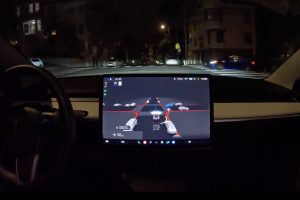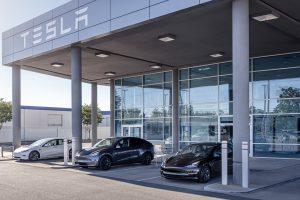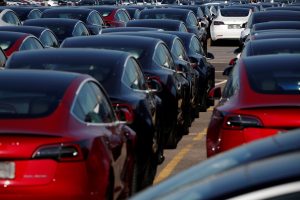- 🕵️♂️ Tesla filed an international patent for an automatic sanitation system for its upcoming Robotaxi fleet.
- 🚗 The fleet will consist of Tesla Cybercabs, which are designed based on the Cybertruck.
- 🌡️ The sanitation system uses sensors to detect temperature, humidity, and pathogens.
- ⚙️ The system creates and executes a sanitation routine based on sensor data to maintain a safe environment.
- 🛡️ This technology aims to enhance passenger safety by reducing pathogens between rides.
- ⏱️ It also promises efficient operation, keeping the vehicle interior clean and ready for the next passenger.
- 🗓️ The Robotaxi fleet, including the Cybercab, is set to be unveiled on August 8, 2024.
- 🎨 The Cybercab is expected to be a fully autonomous vehicle without a steering wheel.
- 📈 The new sanitation system is anticipated to improve the overall user experience and potentially boost Tesla’s market value.
In a bold step towards revolutionizing autonomous ride-hailing services, Tesla has recently filed an international patent for an advanced automatic sanitation system intended for its forthcoming Robotaxi fleet. This innovative technology, aimed at ensuring passenger safety and maximizing operational efficiency, has the potential to set new industry standards.
As the world steers towards autonomous transportation, Tesla continues to lead the charge with cutting-edge innovations. The latest buzz surrounds its international patent filing for an automatic sanitation system tailored for its eagerly awaited Robotaxi fleet. With the unveiling of these futuristic vehicles, termed “Cybercabs,” set for August 8, 2024, Tesla is poised to redefine both passenger safety and the autonomous driving experience.
The Cybercab: A Glimpse into the Future
The Cybercab, inspired by Tesla’s iconic Cybertruck, embodies the vision of a self-driving future. Unlike the highly anticipated Model 2, the Cybercab is expected to be a fully autonomous vehicle devoid of a steering wheel, marking a significant leap in autonomous vehicle design and functionality.
Key Features of the Cybercab:
- Autonomous Operation: The elimination of traditional driving controls.
- Design Evolution: A futuristic appearance aligned with the Cybertruck’s aesthetic.
- Unveiling Date: Scheduled for a grand reveal on August 8, 2024.
Sensor-Powered Sanitation: The Core of the Innovation
Central to the appeal of the Cybercab is its advanced automatic sanitation system, specifically engineered to address the unique challenges of shared autonomous vehicles.
How It Works:
- Detection Mechanism:
- Sensors: The system relies on a network of sensors to monitor temperature, humidity, and pathogen presence within the vehicle.
- Real-Time Data: Continuous data collection allows for dynamic adaptation to varying conditions.
- Sanitation Routine:
- Adaptive Response: The system generates a sanitation routine based on the sensor data.
- Environment Adjustment: It then modifies the vehicle’s internal environment to meet a predefined target condition, effectively neutralizing potential threats.
- Component Activation:
- Specific Components: The routine specifies which components to activate to achieve the desired sanitation level.
- Precise Targeting: Ensuring thorough disinfection of high-contact areas.
Benefits of the Sanitation System
The introduction of this technology is set to bring multiple advantages, fundamentally enhancing the functionality and appeal of Tesla’s Robotaxi service.
Passenger Safety Enhancement:
- Pathogen Reduction: By automatically sanitizing the vehicle interior between rides, the system significantly lowers the risk of pathogen transmission.
- Health Assurance: Builds confidence among passengers about the hygienic standards of shared autonomous rides.
Operational Efficiency:
- Uninterrupted Service: The ability to maintain cleanliness without manual intervention ensures a seamless and efficient operation, reducing downtime between rides.
- Cost Savings: Potential reduction in the costs associated with manual cleaning procedures.
User Experience Improvement:
- Convenience: Simplifies the process for vehicle owners and operators, adding value to the overall user experience.
- Enhanced Vehicle Value: Innovations in automatic sanitation can increase the desirability and market value of Tesla vehicles.
The Broader Impact
Patent researcher SETI Park emphasized the transformative potential of this technology for Tesla’s Robotaxi service. The sanitation system not only augments passenger safety but also streamlines operations, ensuring that the high standards of Tesla are maintained consistently across its autonomous fleet.
Park’s analysis suggests that this patent could serve as a pivotal technology, potentially elevating Tesla’s market value and solidifying its leadership in the autonomous vehicle sector.
Conclusion
As Tesla gears up to launch its Cybercab on August 8, 2024, the introduction of an automatic sanitation system underscores its commitment to innovation and passenger safety. The seamless integration of advanced sensor technologies to maintain a pristine and pathogen-free environment exemplifies the future of autonomous ride-hailing services.
Tesla continues to push the envelope, envisioning a world where autonomous vehicles aren’t just a luxury but a hallmark of safety, efficiency, and sophistication.
Final Thoughts
With the imminent debut of the Cybercab, Tesla is not just unveiling a new vehicle; it is unveiling a vision of a safer, more efficient, and technologically advanced future. By pioneering an automatic sanitation system, Tesla sets a high bar for the entire autonomous vehicle industry, laying the groundwork for innovations that will shape transportation for years to come.





